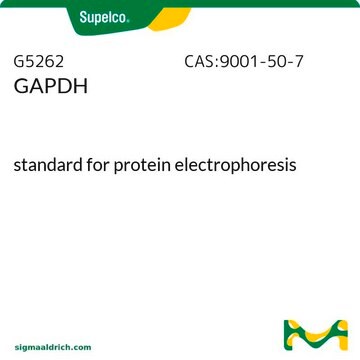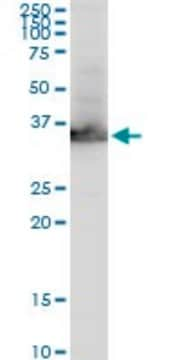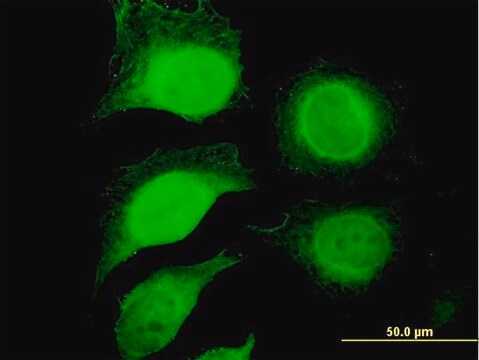G9545
Anti-GAPDH antibody produced in rabbit
~1 mg/mL, affinity isolated antibody, buffered aqueous solution
Synonyme(s) :
Anti-38-kD component, Anti-G3PD, Anti-GAPD, Anti-Glyceraldehyde-3-phosphate dehydrogenase, Anti-OCAS, Anti-OCT1 coactivator in S phase, Anti-p38 component
About This Item
Produits recommandés
Source biologique
rabbit
Niveau de qualité
Conjugué
unconjugated
Forme d'anticorps
affinity isolated antibody
Type de produit anticorps
primary antibodies
Clone
polyclonal
Forme
buffered aqueous solution
Poids mol.
antigen ~36 kDa
Espèces réactives
mouse, rat, human
Concentration
~1 mg/mL
Technique(s)
immunoprecipitation (IP): 5-10 μg using mouse NIH3T3 cell lysates
indirect immunofluorescence: 5-10 μg/mL using rat NRK cells
western blot: 0.1-0.2 μg/mL using whole extract of human HeLa cells
Numéro d'accès UniProt
Conditions d'expédition
dry ice
Température de stockage
−20°C
Modification post-traductionnelle de la cible
unmodified
Informations sur le gène
human ... GAPDH(2597)
mouse ... Gapdh(14433)
rat ... Gapdh(24383)
Catégories apparentées
Description générale
Spécificité
Immunogène
Application
- human cancer cell extract
- extract from muscle tissue from old mice exhibiting sarcopenia
- trabeculae or samples of the mice heart myocardium
- mouse embryonic fibroblasts
Actions biochimiques/physiologiques
Forme physique
Stockage et stabilité
For extended storage, freeze in working aliquots. Repeated freezing and thawing, or storage in “frost free” freezers, is not recommended. If slight turbidity occurs upon prolonged storage, clarify the solution by centrifugation before use. Working dilutions should be discarded if not used within 12 hours.
Clause de non-responsabilité
Vous ne trouvez pas le bon produit ?
Essayez notre Outil de sélection de produits.
Code de la classe de stockage
10 - Combustible liquids
Classe de danger pour l'eau (WGK)
WGK 1
Équipement de protection individuelle
Eyeshields, Gloves, multi-purpose combination respirator cartridge (US)
Certificats d'analyse (COA)
Recherchez un Certificats d'analyse (COA) en saisissant le numéro de lot du produit. Les numéros de lot figurent sur l'étiquette du produit après les mots "Lot" ou "Batch".
Déjà en possession de ce produit ?
Retrouvez la documentation relative aux produits que vous avez récemment achetés dans la Bibliothèque de documents.
Les clients ont également consulté
Articles
The field of proteomics is continually looking for new ways to investigate protein dynamics within complex biological samples. Recently, many researchers have begun to use RNA interference (RNAi) as a method of manipulating protein levels within their samples, but the ability to accurately determine these protein amounts remains a challenge. Fortunately, over the past decade, the field of proteomics has witnessed significant advances in the area of mass spectrometry. These advances, both in instrumentation and methodology, are providing researchers with sensitive assays for both identification and quantification of proteins within complex samples. This discussion will highlight some of these methodologies, namely the use of Multiple Reaction Monitoring (MRM) and Protein-AQUA.
Loading controls in western blotting application.
Warburg effect enhances glucose to lactate conversion in tumor cells, regardless of oxygen levels; impacting cancer metabolism since 1924.
Notre équipe de scientifiques dispose d'une expérience dans tous les secteurs de la recherche, notamment en sciences de la vie, science des matériaux, synthèse chimique, chromatographie, analyse et dans de nombreux autres domaines..
Contacter notre Service technique













